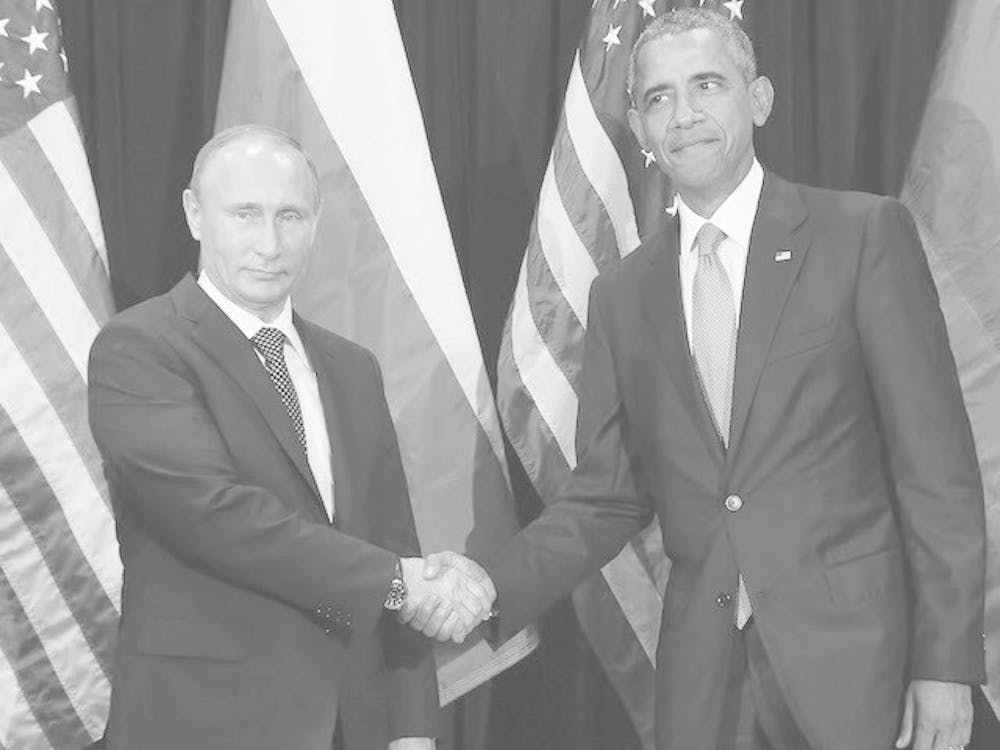By Tom Gbean | Echo
The U.S. and Russia have long opposed each other on the world stage, but the antagonism reached a peaked when the leaders of the two nations met this week at the United Nations Summit. Russian president Vladimir Putin and U.S. president Barack Obama traded words in a verbal battle on key policy issues. Amidst all their talk two issues stuck out: Syria and Crimea.
Although Russia has been ostracized by the West because of its actions in Ukraine and the Middle East, Putin's speech before the U.N. can be seen as a loss for Obama because of the idea that Russia may once again become a key player in the international community. Many analysts, including senator Marco Rubio (R-Fl.), dubbed the meeting a win for Putin. Rubio claims that Obama played into Putin's allegation that the U.S. had failed in world leadership, especially in the Middle East.
Describing the conditions of the states surrounding Syria, Rubio said, "If left with a choice between Russia and nothing, they're going to choose Russia," reported CNN.
Whether or not Rubio is correct, the meeting between Obama and Putin brought out some interesting aspects of each country's policy as seen by both leaders.
Opening up the talks, Obama echoed his administration's disapproval of Syrian president Bashar al-Assad for war crimes he committed against his own people at the start of the Syrian civil war. In his speech, Obama said that the U.S. is willing to work with any country to resolve conflict, but that there can be no return to the prewar status quo in Syria because of the bloodshed and atrocities that took place.
Putin remained steadfast in his support for Assad. He noted that the West should realize there has been no greater force fighting against the Islamist State of Iraq and Levant (ISIS) than Assad's forces and the Kurdish military. Putin expressed that his country feels threatened by the activities of ISIS because of its large Muslim population.
Putin's claims are not without reason. Russia has recently experienced a growth in its Muslim population. Social and political demands, including the call to build more mosques, from the Muslim community have left the country looking for solutions to "the Muslim problem." The government fears that Russian Muslims may contribute to separatist movements and anti-Kremlin forces. They also see the Middle East as a possible aid to those who wish to see Kremlin weakened.
"Muslim leaders and human rights advocates say that Russia's often brutal approach has also added to the appeal of the Islamic State, with the Russian authorities saying recently that hundreds of Russian Muslims have gone to Syria," reported New York Times.
Obama then reiterated his disapprobation of Russia's annexation of Crimea through the use of Russian rebels. Obama posited that better avenues could have been used to smooth out the ethnic and political differences in Crimea. The president said that diplomacy is always better than violence.
Countering Obama's accusations of violence, Putin quickly pointed to some of the faults of the U.S. and the West. Putin specifically alluded to to the U.S.-led invasion of Iraq and the Western-backed rebellion in Libya that contributed to the political, economic and social weakening of the Middle East. Putin also asserted that the European refugee crisis is directly related to the actions of the U.S. and the West.
After each leader had said his piece, they managed to find common ground. NBC news reported that Putin described his talk with Obama as constructive and open. Putin's comment is testament to the fact that the two leaders reached a consensus that Russia and the U.S. can coordinate some of their operations in Syria.
Although it is unknown whether the accord between the U.S. and Russia will last long, Russia's recent actions may overturn any progress in U.S.-Russia relations that may have stemmed from the meeting. Russia announced an intelligence agreement with Syria, Iraq, Iran and Hezbollah on Monday, Sept. 28, just days after the U.N. summit. This move, along with their recent bombings in Syria, may prove disadvantageous for Putin's relations with the U.S. and the West. The formation of the "axis of powers to battle ISIS" may bring back memories of the Axis during World War II. While the two leaders spoke of coordinating their operations in Syria, Russia issued these bombings without any word to Washington.
For now, however, we can all take heart in the fact that the two world leaders are communicating-a sign that may mean better cooperation in the future.




